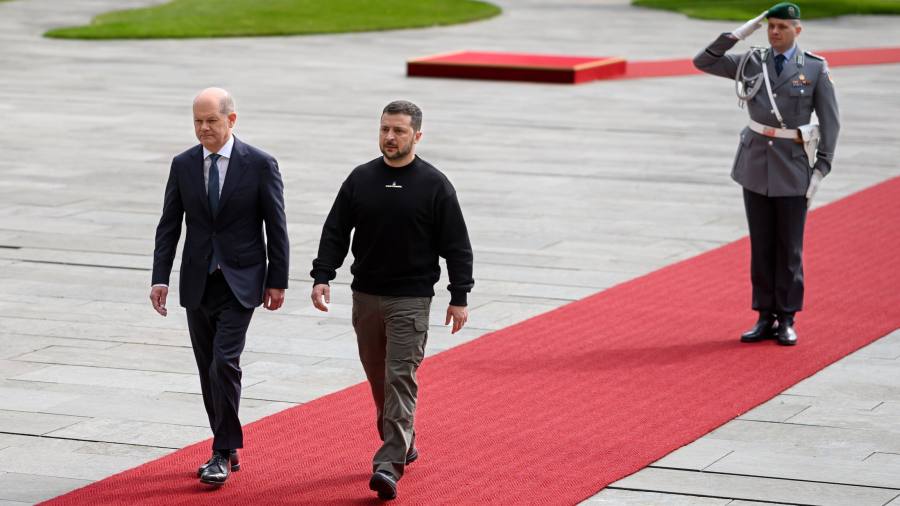President Volodymyr Zelenskyy praised Germany as a “true friend and reliable ally” after it announced it will supply €2.7bn of additional military help for Ukraine and build a weapons factory in the country.
Zelenskyy’s visit to Germany on Sunday, his first since Russia’s full-scale invasion of Ukraine in February 2022, marks a significant improvement in bilateral ties after Kyiv, at the onset of the war, accused Germany of dithering in its support for Ukraine.
Zelenskyy met German chancellor Olaf Scholz, president Frank-Walter Steinmeier and other officials a day after visiting Rome to meet Italian leaders and Pope Francis.
Germany, which in January decided to send its Leopard 2 main battle tanks to Ukraine, on Saturday announced it will provide the country with additional weapons worth €2.7bn to Ukraine. According to the German defence ministry, Berlin has provided €4.2bn of military aid since 2022.
German heavy weapons manufacturer Rheinmetall on Saturday announced that it will build a factory to repair and service tanks in Ukraine in a joint venture with state-owned defence group Ukroboronprom.
The deliveries will include 18 self-propelled howitzers, four IRIS-T SLM air defence systems, 30 older Leopard 1 MBTs and 20 Marder infantry fighting vehicles, as well as artillery munition. In a post on Twitter, Zelenskyy called the deal the “largest military aid package since the beginning of the full-scale Russian invasion” and said German equipment was “saving Ukrainian lives and bringing us closer to victory”.
Reflecting the improved ties, defence minister Boris Pistorius said Germany would provide help for “as long as its takes” to end the “Russian war against the Ukrainian people”. In April last year, Steinmeier scrapped a visit to Ukraine after admitting he would not be welcome, though the German president did meet his Ukrainian counterpart in Kyiv in October.
Rheinmetall’s chief executive Armin Papperger said on Saturday that the German arms maker would “jointly produce selected Rheinmetall products in Ukraine” with Ukroboronprom.
On Sunday afternoon, Zelenskyy and Scholz travelled to the western German city of Aachen where the Ukrainian president and his country’s people will be awarded a prize to honour achievements in fostering European unification.
Zelenskyy’s overnight flight to Berlin came as Russian forces conducted air strikes on Ternopil, a western city home to electronic music duo Tvorchi who were at the time representing Ukraine in the finals of the Eurovision Song Contest. Won last year by Ukraine’s Kalush Orchestra, this year’s Eurovision contest was held in Liverpool in the UK instead of Ukraine due to security concerns.
Zelenskyy arrived in Berlin after a trip to Rome, where he met Italian president Sergio Mattarella and prime minister Giorgia Meloni, who said Rome endorsed Kyiv’s own 10-point peace plan.
Italy, which signed a joint declaration with Zelenskyy supporting Ukraine’s bid to join the EU and Nato military alliance, has contributed around €1bn in military and humanitarian assistance to Ukraine since the start of the conflict, including Samp-T air defence systems. “We are betting on the victory of Ukraine,” Meloni said in a press appearance with Zelenskky.
Zelenskyy met Pope Francis, who has been criticised by some Ukrainians for his reluctance to explicitly denounce Russia for its full-scale invasion. Pope Francis surprised many when he told reporters in early May that he was involved in a secret “peace mission”, which neither Kyiv nor Moscow said they knew anything about.
While Zelenskyy said he was grateful for the pontiff’s interest in the plight of more than 19,000 Ukrainian children taken to Russia, he also called on Pope Francis to hold Russia to account and support Ukraine’s 10-point peace plan. The International Criminal Court earlier this year announced an arrest warrant for Russian president Vladimir Putin, citing forced deportations of Ukrainian children.
“There can be no equality between the victim and the aggressor,” said the Ukrainian president. “I also talked about our peace formula as the only effective algorithm for a just peace. I proposed joining its implementation.”
Additional reporting by Giuliana Ricozzi in Rome
Read the full article here
